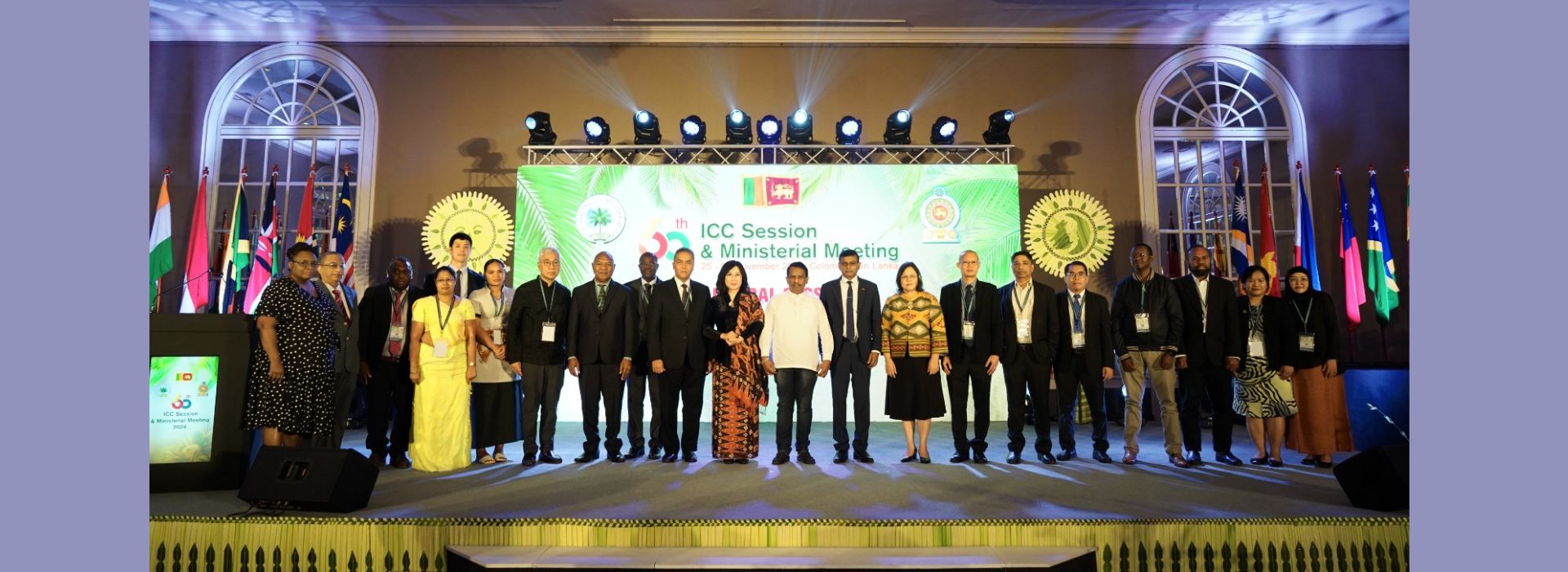The 60th Session and Ministerial Meeting of the International Coconut Community (ICC), the highest decision-making body of the organization, officially commenced today at the Hilton Hotel in Colombo. Member countries of the ICC, collectively accounting for over 90% of global coconut production, are participating in this prestigious four-day event (November 25–28, 2024). Ministers and delegates from 21 member countries, along with representatives from international partner and observer organizations, were in attendance. This landmark gathering is hosted by the Government of Sri Lanka, a proud founding member of the ICC.
The objective of the meeting is to resolve critical issues concerning the sustainable development of the coconut industry, such as cultivation, refining, marketing, and trade. The global coconut situation will be reviewed, national programs will be shared, and policies will be developed to encourage the sector's development. Participants will also collaborate on these initiatives.
A traditional illumination of the oil lamp marked the commencement of the inaugural session, which was immediately followed by the Sri Lankan national anthem. The welcome remarks were delivered by Mr. B.K. Prabath Chandrakeerthi, Secretary of the Ministry of Plantation and Community Infrastructure, who underscored Sri Lanka's dedication to the coconut industry. Mr. B.K. Prabath Chandrakeerthi, Secretary of the Ministry of Plantation and Community Infrastructure, warmly welcomed all participants to the 60th ICC Session and Ministerial Meeting. He expressed gratitude to the ICC for choosing Sri Lanka as the host country and acknowledged the dedication of the delegates who traveled from afar. He emphasized the importance of this gathering, which brought together a diverse group of policymakers, industry leaders, researchers, farmers, and stakeholders to collectively shape the future of the coconut industry.
Mr. Chandrakeerthi highlighted Sri Lanka's deep connection to the coconut sector, its central role in the nation's economy and culture, and its significant contribution to the global coconut industry. He noted that the coconut industry in Sri Lanka provides livelihoods for millions and contributes significantly to the country's GDP through exports. However, he also acknowledged the challenges faced by the sector, such as attracting younger generations to plantation work, underutilized land, limited access to modern technology and finance, and global challenges like market access limitations, pests and diseases, and climate change.
Mr. Chandrakeerthi emphasized the importance of collaboration and innovation to address these challenges and ensure the industry's resilience. He proudly mentioned Sri Lanka's partnership with the United Nations Industrial Development Organization (UNIDO) on a comprehensive roadmap for coconut sector development, focusing on enhancing productivity, fostering innovation, and improving market competitiveness. He expressed his belief that the 60th ICC Session would serve as a valuable platform for international collaboration, knowledge exchange, and the development of solutions to shared challenges, ultimately contributing to the sustainable growth of the global coconut community.
Dr. Jelfina C. Alouw, Executive Director of the ICC, then addressed the gathering. She expressed her gratitude to the Government of Sri Lanka for their hospitality and acknowledged the presence of delegates from 13 member countries and representatives from 11 international organizations. Dr. Alouw emphasized the historical significance of Sri Lanka hosting the ICC Session for the fourth time, highlighting the country's enduring commitment to the coconut sector. She acknowledged the global challenges facing the industry, including climate change, food and energy security, environmental concerns, and economic resilience. Dr. Alouw stressed the importance of ensuring fair incomes for farmers while maintaining affordability and competitiveness for industries to foster sustainable growth across the sector. Dr. Alouw highlighted the session as a platform to share insights into national programs, explore growth opportunities, address shared challenges, and collaborate on solutions. She expressed her hope that the session would inspire valuable collaborations and transformative actions, advancing the ICC's mission to new heights.
The session was duly initiated by the Hon. Samantha Vidyarathne (MP), Minister of Community Infrastructure and Plantation. The Minister emphasized the importance of the coconut sector to Sri Lanka's economy and the necessity of sustainable practices to guarantee its future in his address.
The Hon. Samantha Vidyarathne (MP), Minister of Plantation and Community Infrastructure, officially opened the session. In his address, the Minister emphasized the deep-rooted history of the coconut industry in Sri Lanka and its significance to the nation's economy, culture, and daily life. He acknowledged the challenges faced by the sector, including the need for increased international collaboration and the adoption of modern technology to advance the industry. Minister Vidyarathne expressed his confidence in the collective efforts of the ICC member countries to enhance the sector's economic contribution and ensure its sustainable growth. He reaffirmed Sri Lanka's commitment to working together with the global coconut community to achieve a prosperous future for the industry.
Mr. Sajeewa Kandambi, a Coconut Development Officer, shared his experiences and insights from the International Certificate Course for Coconut Development Officers, emphasizing the significance of capacity building in the sector.
The keynote speech was delivered by Dr. Sanathanie Ranasinghe, the former Director of the Coconut Research Institute of Sri Lanka (CRISL), and it concentrated on the opportunities and challenges that the global coconut industry is currently confronting.
The first day also featured the formal adoption of the meeting agenda and remarks from the national ministers in attendance. In the afternoon, plenipotentiary delegates from a variety of member countries, starting from Côte d'Ivoire, and continued by Fiji, India, Indonesia, Jamaica, Kenya, Papua New Guinea, Philippines presented their national coconut development agendas. These presentations addressed a diverse array of subjects, including strategies for enhancing farm productivity and increasing farmers' income, as well as reforestation and rehabilitation programs. At the end of 1st day session, there was discussion among delegations.








